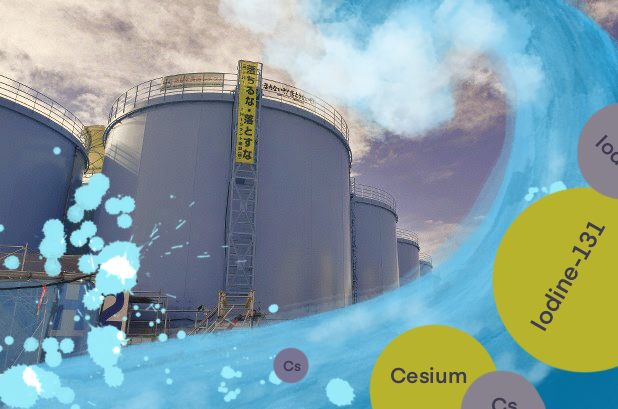An announcement made by the Japanese government has sparked controversy around the globe.
This declaration, made on Tuesday, April 13, featured Japan’s plan to gradually release 1.25 tons of treated wastewater from the Fukushima Daiichi Nuclear Power Plant. They plan to dispose of the water in small increments over 40 years, with the start date set for two years from now.
“Releasing the treated water into the sea is a realistic solution,” said Prime Minister Yoshihide Suga during a Cabinet meeting endorsing the plan. “We will do our utmost to keep the water far above safety standards.”
Japan proposed this plan to deal with trace amounts of tritium and radionuclides in the Fukushima wastewater, in hopes that diluting it in the ocean will bring the radioactivity in the particles to a safe level.
However, the original cause of their problems with containing the nuclear wastewater stemmed from a series of devastating events that occurred roughly a decade ago.
On March 11, 2011, a 9.0 magnitude earthquake rocked Japan, followed closely by a 15-meter tsunami that washed over the Miyagi and Fukushima prefectures.
The human death toll was close to 19,500.
“The traffic lights had stopped working, and there was massive congestion, rows, and rows of cars,” Natsuko Komuro, a survivor, told the BBC. “Words failed me because there [was] nothing there, the things that are supposed to be there, everything [was] gone.”
However, the destruction caused by the combination of natural disasters was not the only source of casualties. In the months after reconstruction had begun, many evacuees and workers developed health and social problems related to radiation exposure.
These surfacing health issues resulted from the fallout of the Fukushima Daiichi Nuclear Plant, whose water treatment units had been severely damaged by the tsunami. For several days these units remained disabled, with an unknown amount of radiation seeping into the surrounding air and ground.
“The level of contamination [was] such that if these radiation levels were found in a laboratory inside a controlled nuclear facility, it would require intervention from at least the plant management, and it would have to be closed off and decontaminated,” said Shaun Burnie, a senior nuclear specialist for Greenpeace Germany.
For many years afterward, workers labored to contain the nuclear waste that had leaked from the units of the treatment plant. Finally, they were able to house a large part of the contaminated water in concrete containers, where it was treated to remove radioactive particles.
Although the Japanese government has assured that the water that is released will not harm humanity in any significant way, many critics of this decision remain doubtful.
Victor Gao, a Chinese international relations expert, and translator believes that the after-effects of dumping nuclear wastewater are severe.
“[This decision] will impact the livelihoods of not only this generation. You’re not talking about one or two generations; you’re talking about potentially 10 or 100 generations. It will not just happen, and disappear, for example, without a trace,” Gao said.
In an interview with the Chinese Global Television Network (CTGN), Gao also explained how nuclear wastewater could affect all countries, not just Japan.
“Seawater moves around very rapidly. It may move from the Pacific Ocean into the Indian Ocean then into the Atlantic Ocean, so it has the potential to create long-term contamination of the global ocean system,” Gao said. “It will have a negative impact on human beings and marine life. Everything we can think of.”
The pollution of the water near the coast of Japan has also led environmental activists to question its impacts on marine life.
“There is fear that the radioactive materials could accumulate in the food chain and damage DNA, possibly leading to mutations. The concerns are valid, especially since there isn’t a huge amount of research on the long-term effects of radioactivity, even at low levels,” said Claire Bing, a junior and vice president of the Climate Change Club.
Besides the possible damage to the DNA of aquatic plants and animals, this announcement is sure to prompt a change in the public mindset regarding radiation. This, in turn, could lead the Japanese fishing industry to decline.
“The concern isn’t that the fish will be unsafe to eat. The fishermen fear that this announcement will make the public think that Fukushima seafood is unsafe, leading the fragile economy built there to collapse,” Bing said. “So, they are more afraid of people’s perception of radioactivity than its actual effects.”
In the end, Japan’s step forward in the disposal of nuclear wastewater leaves much controversy in its wake, with the future of the world hanging in the balance.
“This is way beyond a decision by one country. This has the implication to affect all of humanity and alter life as we know it,” said Gao.























